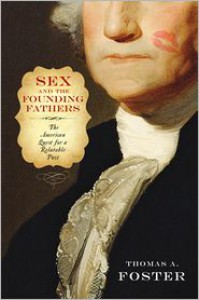Currently reading
Jennifer, Gwyneth & Me: The Pursuit of Happiness, One Celebrity at a Time
Mr. Mercedes
Arduino Projects Book
Sex and the Founding Fathers: The American Quest for a Relatable Past
 Sex and the Founding Fathers does not directly deal with sex and the founding fathers, as you might expect. Instead the author examines how people have remembered the founding fathers and their sex lives throughout history. He argues that how we view the founding fathers says something about our values. We like to imagine that the founding fathers were paragons of virtue. How we remember them shows what we think an ideal American should be like.
Sex and the Founding Fathers does not directly deal with sex and the founding fathers, as you might expect. Instead the author examines how people have remembered the founding fathers and their sex lives throughout history. He argues that how we view the founding fathers says something about our values. We like to imagine that the founding fathers were paragons of virtue. How we remember them shows what we think an ideal American should be like.I was quite excited to start this book. However, the book I expected was actually about the founding fathers, with commentary on their biographies on the side. I also expected some good narrative non-fiction from the parts describing the founding fathers. This book met neither of those expectations. Instead of talking directly about the founding fathers, the author only describes them through the medium of other biographies. At times, this degenerated into lists of quotes from other biographies, which could get quite dry. The organization was a bit iffy as well. Organizing by topic was a wise choice, but the author didn’t always stay on topic. He repeated himself quite a bit, both between topics and between founding fathers.
Despite the dry tone and disorienting organization, I still could have liked this book if the topic was handled well. However, the author is constantly making sweeping assertions about the type of biographies published at different times. He only supports these assertions with cherry picked examples. If he wants to make broad claims, he needs to support them with numbers. For instance, he claims that more biographies considered the possibility Washington was infertile once infertility became a prevalent social problem. In that case, a greater percentage of published biographies should begin to include that possibility. Just sharing a few examples of such biographies tells me nothing. Alternately, the author could have added scholarly acumen to his book by sharing the truth of the founding father’s lives, instead of just sharing what previous biographers have claimed. In the absence of any scholarly contribution, it’s hard to overlook the fact that this just wasn’t an entertaining read. I had high hopes for this book going in, but I find myself unable to recommend it.
This review first published on Doing Dewey.






